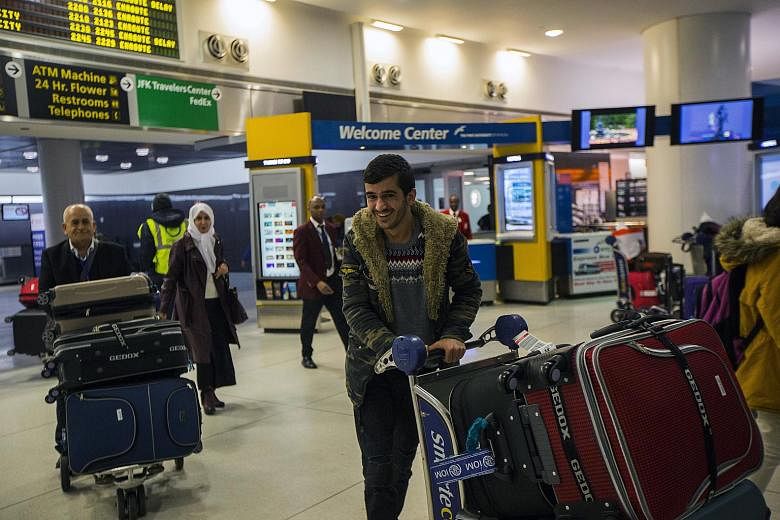WASHINGTON (NYTIMES) - President Donald Trump signed an executive order on Tuesday (Oct 24) resuming the admission of refugees to the United States under tighter security screening. But administration officials said they will subject 11 unidentified countries to another 90-day review for potential threats.
The order lifted a suspension on new refugee admissions that Trump first imposed shortly after taking office in January. At the time, it was part of a broader effort to limit the flow of foreigners admitted to the United States on the grounds of security, an initiative that has generated one of the sharpest legal and political debates of his nine-month-old presidency.
The president's decision to lift the suspension, however, will not end the debate. Administration officials were vague about the additional 90-day review of the 11 countries, refusing even to name them, citing law enforcement sensitivities. They said refugees from those countries could still be admitted on a case-by-case basis during the 90 days if their entry is deemed in the national interest, and they do not pose a threat to the security or welfare of the United States.
It was not clear whether the new screening procedures would significantly diminish the chances for many applicants. While refugees who were vetted and approved before Trump took office have been allowed into the country this year, no new applications have been processed or approved since June.
Trump has already moved aggressively to scale back the nation's refugee programme, imposing a limit of 45,000 - the lowest in more than three decades - on the number of people fleeing persecution that can be resettled in the United States over the fiscal year that started on Oct 1. The action announced on Tuesday, while restarting the admissions process halted earlier this year, could result in new roadblocks or even outright bans for refugees from the 11 countries, potentially narrowing the pool even further.
Refugee advocates said the new order is objectionable, noting that refugee applicants were already carefully screened and that no American has been killed in a terrorist attack by a refugee in the current era of concern over foreign-sponsored terrorism dating to the Sept 11 attacks.
"The administration has had more than six months to review this policy" and "they've come back in October to reimpose what will largely be seen as another unreasonable ban that primarily affects Muslims," said Eric Schwartz, president of Refugees International. He called it "a cynical and tragic manipulation of administrative process" that "conflicts with U.S. values and interests." The White House said that both reviews - the one that has been completed and the new, 90-day one - both aim to secure the United States from a clear danger from terrorist groups seeking to infiltrate the country. "The review process for refugees" required by the president "has made our nation safer," the new order said.
The president's order came hours after the Supreme Court dismissed the last remaining appeal in a pair of cases challenging an earlier version of Trump's travel restrictions, signed in March.
The March order was replaced in September with broader limits, so the court, in a brief, unsigned disposition, said the case was now moot. "We express no view on the merits," the court said. But the September version has separately been blocked by federal district courts in Hawaii and Maryland and it may yet reach the Supreme Court.
The dismissal on Tuesday mostly amounted to judicial housekeeping, clearing out challenges to the March order as the justices await eventual appeals from the one issued in September. But the Supreme Court did a little more than simply remove the case from its docket. It also vacated the decision under appeal, from the 9th US Circuit Court of Appeals, in San Francisco, meaning it cannot be used as a precedent.
Justice Sonia Sotomayor dissented, saying that she would have simply dismissed the case and allowed the appeals court decision to remain on the books.
Erasing that precedent may have implications for the new challenge to the September order. Last week, in blocking the new order, Judge Derrick K. Watson, of the US District Court in Honolulu, relied heavily on the 9th Circuit's decision.

